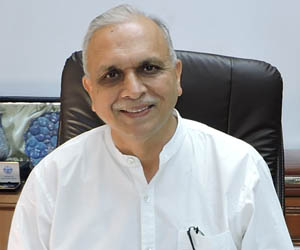What is the concept of service? Swami Vivekananda says: “This is the gist of all worship — to be pure and to do good to others. He who sees Shiva in the poor, in the weak, and in the diseased, really worships Shiva; and if he sees Shiva only in the image, his worship is but preliminary.”
The idea that service of the poor is akin to worshiping the God. The idea is deeply ingrained in Indian spiritual thinking. Quoting Swami Vivekananda: “If you want to find God, serve man. To reach Narayana you must serve the Daridra Narayanas – the starving millions of India…”
Doing service is a way of realizing oneself. How? By killing one’s ego one achieves self-growth. Sri Aurobindo says: “The joy of service and the joy of inner growth through work is the sufficient recompense of the selfless worker.”
Service cannot be a spectacle. It cannot be done unless one derives deep satisfaction from it. Mahatma Gandhi says: “Service can have no meaning unless one takes pleasure in it. When it is done for show or for fear of public opinion, it stunts the man and crushes his spirit. Service which is rendered without joy helps neither the servant nor the served.” That is the idea of shramdaan.
The central message of Vedanta is that of oneness and divinity. Every being, every particle in the universe is divine and linked to each other. Therefore, when we do service and help a poor person, we are doing no act of kindness. Since we are linked with each other, helping the needy is tantamount to helping oneself. Charity is not service in the true sense. The recipient of a charitable deed is not inferior to the giver. Service has to be done with humility otherwise it is not service.
Social service is the most visible aspect of the concept of service. The holy Gita (12th chapter) says that “a devotee must overcome hatred and all sense of ownership and selfishness”. The Gita promotes awareness of all comprehensive unity which is the basis for treating everyone with love and respect. This provides the moral justification for not being selfish and devoting oneself to service.
The ideal of service is universal and it contained and is found in all religions. Some aspects of service can be summarized as follows:
- There is a relationship between service, work and worship; work as worship: work is worship.
- Service is open worshiping the God.
- Service kills ego. This is a step towards liberation.
- Service is going outwards; worship is looking inwards. This way work and worship combine inwards and outwards aspect of our personality.
- Motive behind service is very important. An act of charity transforms into an act of worship when it done with the right motive. There should be no hidden agenda behind the good deed. Service done with the motive of overcoming guilt or a feeling of pity, or gaining recognition, or from a sense of duty is incomplete.
- Swami Vivekananda said, “It is only by doing good to others that one does good to oneself”.
Service helps overcome of problems of the world
The modern world has been transformed by great material achievements. The Information and Communication Technology (ICT) revolution has brought tremendous connectivity. The advances in science and technology have made life comfortable. Yet, many of us, from time to time, experience alienation. The lack of spiritualism makes our lives less enjoyable. Loneliness, depression and mental disorder, are becoming rampant. Conflicts and violence are all around us. Thousands of people have been displaced and have been enforced to leave their hearths and homes and migrate elsewhere. Millions of children are born in refugee camps in miserable conditions. Climate change and its negative consequences are upon us. The greed is destroying the planet. How does one overcome these maladies?
The answer lies in restraining desires, overcoming greed and selfishness. Teaching selflessness should become the essential component of educational curricula. India’s ancient philosophy needs to be told and presented in practical and understandable form.
Selfless service is the answer to many of the contemporary problems. Even in the most developed countries like the US, the institution of philanthropy is quite strong. In India too many colleges and hospitals are run on philanthropy. Some of the top centers of learning, like the Harvard or Yale universities, have tens of billions of dollars received in philanthropy, to be used in promoting education.
We must go back to the Vedantic concept of selfless service for spiritual betterment of the individual and the society. Service is a practical idea. It gives concrete shape to the highest truths of Indian spiritual thinking. Practical service takes many forms. Organisations like the Ramakrishna Mission and many others are engaged in useful selfless inspiring practical work. In India, hospitals, schools, educational programmes, social awareness drives, skill building schemes and a variety of the activities are done as acts of philanthropy and selfless service. These are highly commendable.
But India’s problems are huge. Unless the ideal of selfless service is imbibed in youth from the young age both at home, schools and colleges, the challenge of helping the needy will always remain. Universities are good place to start with. Young people have idealism, energy and enthusiasm to do something. However, they are also overwhelmed by the challenges and struggle of daily life. They also need direction and guidance. Philanthropy must be ingrained from childhood.
How does service help?
How does service help an individual? Inculcating the idea of selfless service can help the youth to:
- Build a strong character;
- Prepare them for life’s struggle;
- Generate empathy for others;
- Build society and nation;
- Become better human beings;
- Achieve happiness.
Vivekananda is an icon for us Indians, particularly for the youth. He said, “The national ideals of India are renunciation, and service ... if you want to find God, serve man”. And further, “Practical patriotisms means not a mere sentiment or even emotion of love of the motherland but a passion to serve our fellow-countrymen”.
He showed the path to making every man great, every nation great. How? He believed in the power of goodness; absence of jealousy and suspicion; and helping all who are trying to be and do well. It is an imperative that the Indian youth should take to service.
Message to the Youth
The youth need to be shown light right from the beginning. Here are some quotes from Swamiji which generates self-confidence and provide inspiration:
- 'Work hard. Be holy and pure, and the fire will come.'
- 'Do not be anxious, do not be in a hurry. Slow, persistent and silent work does everything.'
- 'Practice hard; whether you live or die does not matter. You have to plunge in and work, without thinking of the result.'
- "The only way to rise is by doing the duty next to us, and thus gathering strength, go on until we reach the highest state"
- "Work for work’s sake. Worship for worship’s sake. Do good because it is good to do good. Ask no more."
Selfless service, done without expectation of reward, can do wonders for self and for the nation.
(Based on speech delivered Dr Arvind Gupta, Director VIF, at the Jawaharlal Nehru University, New Delhi on 12 Jan 2019)
Image Source: https://www.eventjournal.com/wp-content/uploads/2015/03/Helping-Hands.jpg











Post new comment